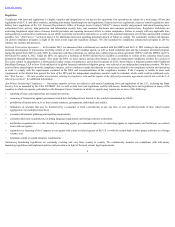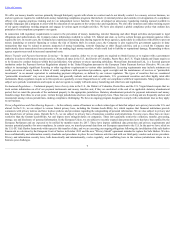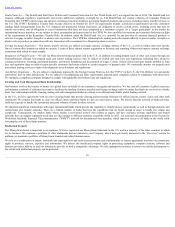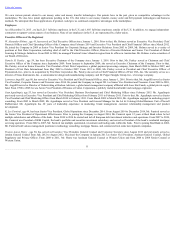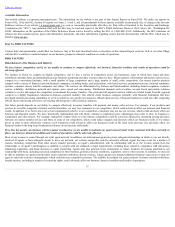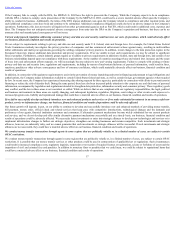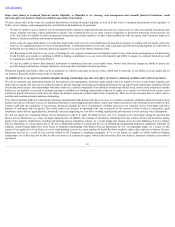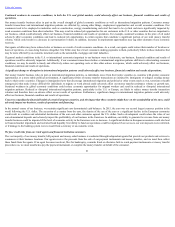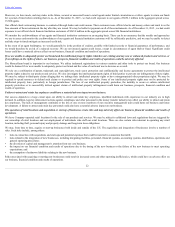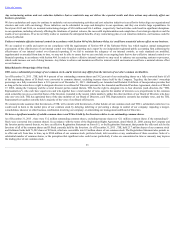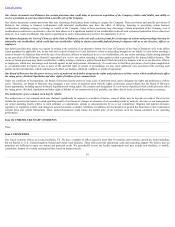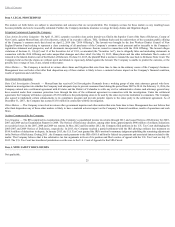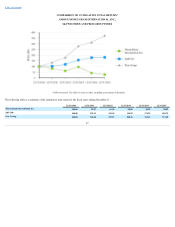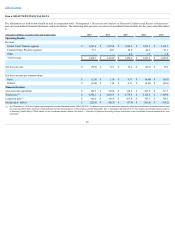MoneyGram 2015 Annual Report Download - page 19
Download and view the complete annual report
Please find page 19 of the 2015 MoneyGram annual report below. You can navigate through the pages in the report by either clicking on the pages listed below, or by using the keyword search tool below to find specific information within the annual report.
Table of Contents
Changes in tax laws and unfavorable outcomes of tax positions we take could adversely affect our tax expense and liquidity.
Our future tax rate could be adversely affected by changes in tax laws, both domestically and internationally. From time to time, the U.S. and foreign, state and
local governments consider legislation that could increase our effective tax rates. If changes to applicable tax laws are enacted, our results of operations could be
negatively impacted.
We file tax returns and take positions with respect to federal, state, local and international taxation, including positions that relate to our historical securities losses,
and our tax returns and tax positions are subject to review and audit by taxing authorities. The Internal Revenue Service (the "IRS") issued a Revenue Agent Report
(“RAR”) for the tax years 2011 through 2013 that included disallowing $100.0 million of deductions related to payments the Company made to the U.S.
government in connection with the DPA. While we have filed a protest letter contesting this adjustment, we may not be successful in maintaining our original tax
position. An unfavorable outcome in these audits or other tax reviews or audits could result in higher tax expense, including interest and penalties, which could
adversely affect our results of operations and cash flows. We establish reserves for material known tax exposures; however, there can be no assurance that an
actual taxation event would not exceed our reserves.
Our substantial debt service obligations, significant debt covenant requirements and our credit rating could impair our access to capital and financial
condition and adversely affect our ability to operate and grow our business.
We have substantial interest expense on our debt, and our ratings are below “investment grade.” This requires that we access capital markets that are subject to
higher volatility than those that support higher rated companies. Since a significant portion of our cash flow from operations is dedicated to debt service, a
reduction in cash flow could result in an event of default, or significantly restrict our access to capital. Our ratings below investment grade also create the potential
for a cost of capital that is higher than other companies with which we compete.
We are also subject to capital requirements imposed by various regulatory bodies throughout the world. We may need access to external capital to support these
regulatory requirements in order to maintain our licenses and our ability to earn revenue in these jurisdictions. An interruption of our access to capital could impair
our ability to conduct business if our regulatory capital falls below requirements.
There are a number of risks associated with our international sales and operations that could adversely affect our business.
We provide money transfer services between and among more than 200 countries and territories and continue to expand in various international markets. Our
ability to grow in international markets and our future results could be adversely affected by a number of factors, including:
• changes in political and economic conditions and potential instability in certain regions, including in particular the recent civil unrest, terrorism and political
turmoil in Africa, the Middle East and other regions;
• restrictions on money transfers to, from and between certain countries;
• currency controls and repatriation issues;
• changes in regulatory requirements or in foreign policy, including the adoption of domestic or foreign laws, regulations and interpretations detrimental to our
business;
• possible increased costs and additional regulatory burdens imposed on our business;
• the implementation of U.S. sanctions, resulting in bank closures in certain countries and the ultimate freezing of our assets;
• burdens of complying with a wide variety of laws and regulations;
• possible fraud or theft losses, and lack of compliance by international representatives in foreign legal jurisdictions where collection and legal enforcement
may be difficult or costly;
•reduced protection of our intellectual property rights;
• unfavorable tax rules or trade barriers;
• inability to secure, train or monitor international agents; and
• failure to successfully manage our exposure to foreign currency exchange rates, in particular with respect to the euro.
In particular, a portion of our revenue is generated in currencies other than the U.S. dollar. As a result, we are subject to risks associated with changes in the value
of our revenues denominated in foreign currencies. Fluctuations in foreign currency exchange rates could adversely affect our financial condition. See “ Enterprise
RiskManagement-ForeignCurrencyRisk” in Item 7A of this Annual Report on Form 10-K for more information.
18


